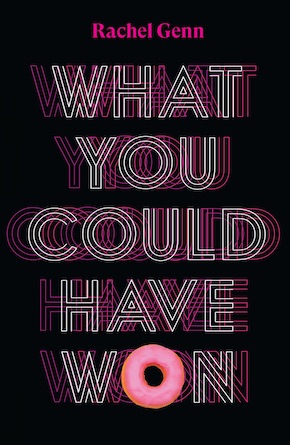Limelight’s shadow
by Brett Marie
“Sensuous, fraught-languorous, and wholly compelling… a triumph of wit, stylish prose and observation. I loved it.” Eley Williams
A neuroscientist by trade, Rachel Genn draws from a deep well of jargon to fill her novel What You Could Have Won. The two words that stick in my head for much of the time I’m reading it aren’t too obscure: Toxicity and Tragedy. It’s no wonder: the novel’s main character Astrid spends a good deal of time steeped in the former while barrelling toward the latter.
Pop singer Astrid is a familiar character: a rising star with a hit record, a flawed heroine whose struggle with drug addiction threatens to engulf her even as she rockets through the stratosphere of superstardom. Hampering her efforts to clean herself up are her fragile emotional make-up, the new-found pressures of public life and a retinue of enablers, among them a narcissistic lover with an agenda of his own. To save herself, Astrid will have to withstand everything from the pressure cooker of the music industry to the head games of a less-than-orthodox rehab programme.
Two tragedies from outside Genn’s fiction hover over the proceedings. The first, used to great effect throughout the story, is the death of Astrid’s favourite character in The Sopranos, the box set of which she and her psychologist boyfriend Henry have been watching together, each for the first time. The second is never stated in the book but is featured front-and-centre in its press, in this quote from Genn: “I wrote this novel because I didn’t want Amy Winehouse to be dead.” The portrayal of Astrid’s character as the midpoint between her Sopranos heroine (a young woman in a toxic relationship) and the real-life Winehouse (a talented singer in a toxic relationship) is hardly a coincidence, and it seems while following Astrid’s story that perhaps Genn wants to use a stand-in to give these two tragic figures a do-over.
Genn agrees when I float this idea to her. “Since What You Could Have Won is the actual computation of the experience regret,” she tells me, “I am very into the agony of ‘what if’ as a mechanic of counterfactual thought (and of course the ‘if only’ of which regret is a result). I want to give a complicated, talented, damaged woman the air in which she could flourish while also providing a blackness… to get Astrid to emerge into the light.”
While it might have been tempting to tell Astrid’s story solely from the protagonist’s point of view, Genn presents it in alternating chapters, switching every dozen or so pages to her lover/nemesis.”
It’s not a unique set-up for a story. Quentin Tarantino used last year’s Once Upon a Time in Hollywood to imagine a way for doomed actress Sharon Tate to escape her sad real-life fate at the hands of the Manson Family – with delightful results. Of course, the axe hanging over Tate’s head never feels quite as close to the neck in Tarantino’s hands as the one over Astrid. That’s in part because of how often Astrid herself seems to be holding her own axe.
It speaks highly of Genn’s knowledge of human nature that her characters never descend into caricature. While it might have been tempting to tell Astrid’s story solely from the protagonist’s point of view, Genn makes the brave decision to present it in alternating chapters, switching every dozen or so pages to her lover/nemesis Henry’s perspective. And rather than piling villainous thoughts one on top of another to establish Henry’s malignant narcissist credentials, these first-person accounts serve to present him as a fully-formed human being, a researcher uncomfortable with his place in the workplace hierarchy, a hopelessly uncool outsider in the world of luxury Astrid’s music-industry stardom opens up to them. Here Genn’s frequent references to The Sopranos makes for a useful comparison; for many it was that show’s brilliant use of mundane set-pieces to humanise its cast of sociopaths, rendering them endearingly hapless as often as they were sinister, that made it the groundbreaking masterpiece it was. Henry’s struggles with his boss, his public humiliations at a Greek nude beach resort where he and Astrid have retreated (one of these embarrassments involving an incontinent squid), keep our villain from becoming a cartoon.
But if it’s Henry’s narcissism that turns their relationship into a power struggle, Genn’s choice to give Henry his own voice every other chapter comes with risks. While letting this villain explain his motivations, Genn must keep a reader’s sympathy for him reined in just enough. It’s a tightrope walk not every author could manage, but Genn maintains her balance, so that the book’s central relationship opens up into something more engagingly complex than the standard abusive partner trope.
Henry’s chapters are far from the only risk Genn takes. There’s also her decision to tell Astrid’s chapters from the oft-maligned second-person point of view. “Took me so long to get the courage,” she tells me, “changed it into every permutation of tense/POV before settling on it.” It does take courage. For some reason, second person has long been an automatic opening for critics to make charges of pretentiousness and hackery. But in a story from which the main character might not emerge in one piece, a first-person telling would bring with it the implicit assumption that she had survived to give her own account. Second person plucks away that sense of certainty, while at the same time forcing readers in a visceral way to take up Astrid’s suffering for themselves.
POV shifts are one thing. But then there are the smaller, more jarring shifts: the abrupt jumps back and forth in the story’s timeline; the tense shifts; the deep dives into Astrid’s psyche and memory. Most disorienting, and yet somehow the most effective, are the slides into hallucinatory language in moments when Astrid falls apart. Take this moment at the Burning Man festival, in a passage that abruptly switches to third person when the drugs our heroine has just taken start to kick in and she walks off-stage into the crowd:
She walks out into them, on top of them, and she stands on their hands and their heads, and faces if their heads are back. Behold! they say with their necks, throats like snake bellies join to make a path, her steps are working like they do when she walks up the wall and she moves forward and she don’t go down. She escapes above them, her heels are solid cupped in palms and she peels the jumpsuit from her body. She is bare to the waist and she leans forward because what they have been trying to tell her is that this must be the sea because she has to be at the prow of their boat.
All these feats of derring-do make for an engrossing read, and the fact that they so often succeed is a testament to a writer of significant power. And ultimately, it is power itself, both within the plot of What You Could Have Won and in the mechanics of its creation, which becomes the theme on which the entire book hinges. In the same way that it will take all of Astrid’s power to overcome both her own weaknesses and her lover’s domination, it takes power from a storyteller to immerse readers fully into such a harrowing tale. Whether Astrid has the power she needs within her, readers can find out for themselves. As for Rachel Genn’s power as an author, from the first page to the last, that is never in doubt.
 Rachel Genn is a neuroscientist, artist and writer. She was a Leverhulme Artist-in-Residence in 2016, creating The National Facility for the Regulation of Regret, which spanned installation art, VR and film. She has written for Granta, 3:AM Magazine, and Hotel, and is working on a hybrid collection of essays about neuroscience, art and the abjection of artistic reverie. Her first novel The Cure (2011) was published by Constable/Corsair. She works at the Manchester Writing School and the School of Digital Arts at Manchester Metropolitan University, and lives in Sheffield. What You Could Have Won is published by And Other Stories in paperback and eBook.
Rachel Genn is a neuroscientist, artist and writer. She was a Leverhulme Artist-in-Residence in 2016, creating The National Facility for the Regulation of Regret, which spanned installation art, VR and film. She has written for Granta, 3:AM Magazine, and Hotel, and is working on a hybrid collection of essays about neuroscience, art and the abjection of artistic reverie. Her first novel The Cure (2011) was published by Constable/Corsair. She works at the Manchester Writing School and the School of Digital Arts at Manchester Metropolitan University, and lives in Sheffield. What You Could Have Won is published by And Other Stories in paperback and eBook.
Read more
@RachelGenn
@andothertweets
 Brett Marie, also known as Mat Treiber, grew up in Montreal with an American father and a British mother and currently lives in Herefordshire. His short stories and other writing have appeared in publications including The New Plains Review, The Impressment Gang, PopMatters and Bookanista, where he is a contributing editor. His debut novel The Upsetter Blog will be released in Autumn 2021.
Brett Marie, also known as Mat Treiber, grew up in Montreal with an American father and a British mother and currently lives in Herefordshire. His short stories and other writing have appeared in publications including The New Plains Review, The Impressment Gang, PopMatters and Bookanista, where he is a contributing editor. His debut novel The Upsetter Blog will be released in Autumn 2021.
Facebook: Brett Marie
@brettmarie1979


